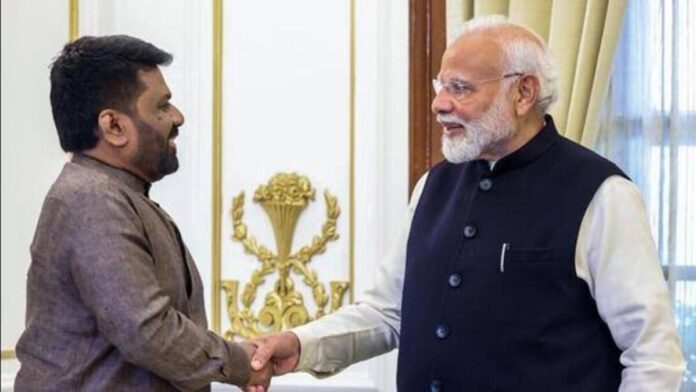Amid worries in New Delhi over China’s efforts to expand its influence over Colombo, Sri Lankan President Anura Kumara Disanayaka assured Prime Minister Narendra Modi on Monday that the island nation’s territory would not be used against India’s interests.
During his extensive discussions with Prime Minister Modi during his three-day visit to India, Disanayaka agreed to quickly finalise a defence cooperation deal and strengthen energy connections by building multi-product petroleum pipelines and electrical grid connectivity.
Modi said in his media statement that he and the president of Sri Lanka were in “full agreement” that the two nations’ security interests are intertwined and that a speedy completion of the security cooperation pact was agreed upon.
Modi assured Disanayaka that India would continue to assist the island nation in its pursuit of stability and economic revival. Two years ago, when Sri Lanka was experiencing a severe economic crisis, India gave the nation USD 4 billion in financial aid. The two leaders gave authorities instructions to complete the bilateral debt restructuring Memorandum of Understanding talks.
“We have adopted a futuristic vision for our partnership. We have laid emphasis on investment-led growth and connectivity in our economic partnership,” Modi said. “We have decided that physical, digital and energy connectivity shall be the key pillars of our partnership. We shall work towards establishing electricity-grid connectivity and multi-product petroleum pipelines between both the nations,” he added.
According to the Sri Lankan leader, the Indian prime minister has promised to uphold Sri Lanka’s sovereignty and territorial integrity at all times.
“I have also given an assurance to the prime minister that we will not allow our land to be used in any way in a manner that is detrimental to the interests of India,” he said. “The cooperation with India will certainly flourish. And I want to reassure our continued support for India,” he added.
Modi emphasised the value of connection by stating that a decision was made to start a ferry service between Talaimannar and Rameshwaram.
“We have jointly decided that, post the successful launch of the Nagapattinam-Kankesanthurai ferry service, we will also initiate a ferry service between Rameshwaram and Talaimannar,” he said.
The prime minister claimed that after discussing the fishermen’s dilemma with the Sri Lankan leader, they decided to take a “humanitarian approach” to it. Modi expressed his hope that the Sri Lankan administration would fulfil the dreams of the island nation’s Tamil population.
“We also talked about reconstruction and reconciliation in Sri Lanka. President Disanayaka apprised me of his inclusive perspective. We hope that the Sri Lankan government shall fulfil the aspirations of the Tamil people,” Modi said. “And that they shall fulfil their commitment towards fully implementing the constitution of Sri Lanka and conducting the provincial council elections,” he said.
The 13th Amendment, which grants the Tamil community in Sri Lanka devolution of authority, has been demanded to be implemented. The 1987 Indo-Sri Lankan agreement led to the introduction of the 13th amendment. According to Foreign Secretary Vikram Misri, Prime Minister Modi asked Disanayaka to follow the Sri Lankan constitution “full and effectively” in order to achieve meaningful devolution of power, during a media conference.
Modi emphasised India’s ongoing commitment to assist Sri Lanka in its attempts to stabilise its economy, according to the foreign secretary.




